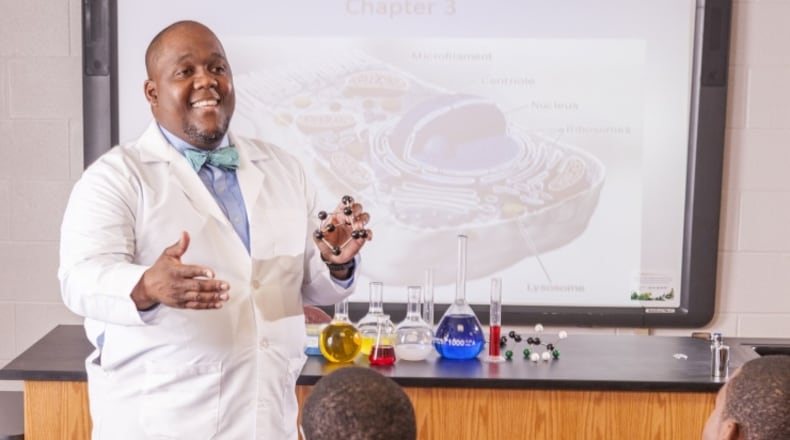Several teachers expressed dismay with my post last week on a new study suggesting black students benefit academically from having black teachers.
A Johns Hopkins working paper found that if a black student has one or two black teachers in elementary school, the student is far more likely to enroll in college. One black teacher by third grade, black students are 13 percent more likely to enroll in college, two black teachers and the students are 32 percent more likely, according to the findings.
The teachers said people would recoil if a study asserted white teachers should teach white students to assure the best outcome. Anyone who made such a statement would be deemed racist, they said.
I took the question to Casey Bethel, the Georgia 2017 Teacher of the Year and now Douglas County's 6-12 science coordinator. In his year as Georgia's top teacher, Bethel talked about the need for more minority educators in the classroom. (You can see Bethel here addressing the issue.)
Here is Bethel’s response:
They are absolutely correct -- suggesting that only white teachers should teach white kids sounds absolutely racist and insulting.
Except that is not the assertion.
No one is recommending that only white teachers teach white kids and black teachers teach black kids. The argument is quite the opposite -- that white students should see both black and white teachers, and the same for black students. Decades ago, the hope of integrating schools was to integrate both the student and teacher populations.
The point isn’t that white woman can’t teach students of color. In the vast majority of cases, teachers have been providing an immense service to all of the students in their classes throughout decades, and they continue to do so. In preparing students to function later in life in a diverse society, young people must be prepared to learn from -- and work with and follow the leadership of -- individuals of all colors and types.
So, white teachers instructing minority students has its benefits. And that is primarily where the crux of this issue resides -- we are simply not providing students with diverse perspectives if the teaching population is almost homogenous.
Beyond that, there are at least two other important benefits to be gleaned from having a more diverse teaching population.
The first time I had a Vietnamese student in my class, early in my career, I recognized the importance of culturally relevant pedagogy. At first, the student (although being academically gifted) was struggling in my class. She eventually helped me to realize she did not pick up on any of the analogies or real-world references I was making during my teaching.
The very same examples I tried to use to clarify or bring relevance to what we were learning sailed over her head, leaving her feeling lost. To get through to her more effectively, I had to become familiar with her cultural background and the realities of her day-to-day life at home.
Sure, I became better at this through time and effort. But I am certain we can all agree that someone who shared backgrounds and experiences with her would have been better equipped to function in this regard -- earlier and more consistently.
From there, is it an easier leap to recognize the benefits of having a more diverse teaching population? Surveys have indicated that a staggering proportion of Asian or Latin-American students in America report traversing all 13 years of school (K-12) without ever encountering a teacher who shares their background. Except in dense urban areas, the numbers are not far off for black students surprisingly.
If you poll engineers, you will discover many became interested in the field because of a family member who was an engineer. Same thing for medical professionals, and various other professions. In the absence of a family member, it is usually another adult they know/trust.
Perform this test -- ask the white female teachers you have access to "Why did they choose teaching?" Record how many of them say either "My mom was a teacher," or "I've always wanted to be like my ___ grade teacher Mrs. Insertlastname."
What then happens to minority kids? How will they ever come to envision themselves as teachers if they’re not exposed to teachers like them? Seeing someone who looks like you performing in a role inherently gives you the courage to think, "I can do that, too."
About the Author
The Latest
Featured



